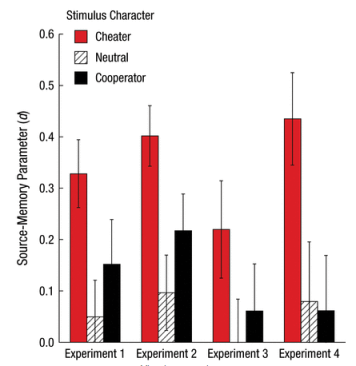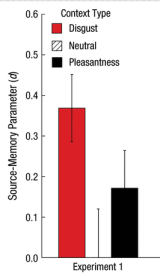 Lying has played an important role in the evolution of humanity. Being able to cheat others out of resources obviously confers advantages upon the deceiver, but it also creates a selection pressure for cheater-detection. Evolution simultaneously develops better cheaters and people better at spotting and stopping them. This eternal battle is the key to the success of our species, since being able to detect cheaters allows us to co-operate in the knowledge the favour will be returned.
Lying has played an important role in the evolution of humanity. Being able to cheat others out of resources obviously confers advantages upon the deceiver, but it also creates a selection pressure for cheater-detection. Evolution simultaneously develops better cheaters and people better at spotting and stopping them. This eternal battle is the key to the success of our species, since being able to detect cheaters allows us to co-operate in the knowledge the favour will be returned.
Even the most successful hunter only makes a kill once a month or so, and is reliant upon getting food from others for the rest of the time. If everyone could freely cheat each other the incentive to share would be lost, since there is no guarantee the investment will be repaid. So the hunter starves to death.
This makes cheat-detection very important, especially to humans. We are one of the few species almost entirely reliant upon such reciprocal altruism for survival. At the same time we are one of the easiest species to cheat, since language has made the investment required to get stuff very small. Telling a lie does not require much effort, after all. The added complexity of language also makes spotting cheaters a lot more cognitively demanding.
In fact, the large intellectual requirements needed to detect liars is so big (and so important) that many once believed that it was one of the primary forces that drove the evolution of our exceptionally large brain. Whilst we have established that other factors are responsible for most of hominin encephalisation, there’s no denying that lying has left its mark on us.
For example, we have developed improved memory for known cheaters, allowing us to recognize and refuse to aid them in the future. Individuals which could do so would be less likely to be repeatedly cheated, giving them a survival advantage. Thus they had more children and the ability spread throughout the entire population, until now every normal individual can more accurately recall the faces of cheaters than non-cheaters.
This has been confirmed time and again by multiple studies. When additional information presented along with the fact that a person cheated, they are still remembered better. When the test subject is asked to recall the faces of individuals weeks later, they still remember cheaters better.

Multiple experiments show people consistently remember cheaters more than others (Bell & Bunchner 2012)
Evolutionary psychologists posit that this is part of a “cheat detection” module in the brain, shaped and refined over the course of human evolution. This is not a “physical” module in the sense that it is a single spot that can be cut out of the brain, but refers to a collection of neurons spread throughout our thinking organ which collectively gives us the ability to spot liars.
EvoPsych believes that evolution has resulted in many such modules granting us all the abilities we needed to survive in the wild. However, this idea has been repeatedly criticised given that these modules are so dispersed that they are essentially impossible to detect directly. You can’t find the cheat-detection module on an fMRI machine, or through any other measurement. The only way to confirm their existence is by looking for behaviours which match our predictions.
The fact that humans have improved memory for cheaters has been touted as confirmation of the existence of the “cheat detection” module. It’s essentially universal, indicating it is likely a trait that has been selected for by evolution and is so specific that it could only really have arisen as part of such a well-defined module. However, recent research has challenged this notion.

People remember disgusting people a lot too (Bell & Buchner, 2012)
It does not challenge the notion that we are better at detecting cheaters, and that this is an evolved response, but reveals that the specific “cheat-detection” module may be a lot more generalised. A similar bias towards remembering other “disgusting” individuals was also observed. One of the examples of such “disgusting” behaviours was an individual who wiped their nose on a shirt sleeve! This was much more likely to be remembered than, for example, someone who was witty enough to cheer up even the most miserable person.
This research presents us with two alternatives: we either have a bunch of additional modules, such as an anti-nose wiping module, or evolution has given us modules which are more generalised than evolutionary psychologists previously thought (i.e. remembering disgusting behavior rather than specifically remembering cheaters). Given the former is unfalsifiable whilst the latter much more parsimonious I’m inclined to side with the idea evolution has produced general “modules” in the brain that confer an adaptive advantage.
Whilst this may challenge some classic evolutionary psychology ideas, it doesn’t really alter what we know about the evolution of lie-detection too much. Many forces (including the benefits lie-detection) created the environment where having the ability to recall (and thus avoid) “disgusting” individuals was evolutionary advantageous. It spread, giving us all the ability to remember liars, sleeve wipers and other disgusting individuals.
So be careful next time you pick your nose in public, people will remember it.
Bell, R., & Buchner, A. (2012). How Adaptive Is Memory for Cheaters? Current Directions in Psychological Science, 21 (6), 403-408 DOI: 10.1177/0963721412458525

